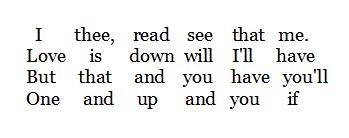As a farmer was going to plough,
He met a man driving a cough;
They had words which led to a rough,
And the farmer was struck on his brough.
One day when the weather was rough,
An old lady went for some snough,
Which she thoughtlessly placed in her mough,
And it got scattered, all over her cough.
While a baker was kneading his dough,
A weight fell down on his tough,
When he suddenly exclaimed ough!
Because it had hurt him sough.
There was a hole in the hedge to get through,
It was made by no one knew whough;
In getting through a boy lost his shough,
And was quite at a loss what to dough.
A poor old man had a bad cough,
To a doctor he straight went ough,
The doctor did nothing but scough,
And said it was all fancy, his cough.
— Anonymous, cited in Carolyn Wells, A Whimsey Anthology, 1906



